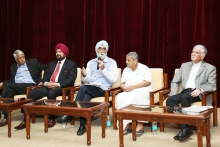Comprehensive education, e-governance and accountability can combat corruption, says General Bikram Singh at IIMB’s CCGC Leaderspeak series 2016

Hosted by IIMB’s Centre for Corporate Governance & Citizenship, the Leaderspeak series looks at ethical issues in public service
August 03, 2016: Listing a lack of ability to enforce regulatory frameworks, a scarcity of resources and a lack of work-based skills to earn livelihood as factors leading to corruption, General Bikram Singh, observed that value-based institutions like the Indian Army could be inspirational in tackling such challenges.
Leading an elite panel that discussed ‘Ethics in Public Life’ at IIM Bangalore on the evening of August 03, the Chief of Army Staff said: “The Army has been able to create a value-based institution since it practices values until they become a habit.”
Dr H.R. Nagendra, Padma Shri awardee and President, S-Vyasa, a world class yoga training centre, shared his views on traditional education that focused on training the mind to increase will power and adhere to values, integrity, honesty, and transparency. “There are two dimensions to mastering the mind. One dimension that we have mastered is intelligence but we are yet to learn the power of silence and introspection. Both dimensions need to be incorporated in our current education system, with the help of yoga. When there is conflict in the mind, both dimensions help one adhere to values.”
The third panellist, V.K. Viswanathan, Chairman Bosch Ltd., remarked that labour, land, skills and innovation could be bought, but not values. “It is therefore important to nurture, institutionalize and enforce values. There is a very thin line between flexibility and compromise. In the fast moving world, in order to succeed, we need to be flexible but we must not comprise on our values, since success achieved through comprising values will not last long,” he explained.
Offering examples from his life, Allen C.A. Pereira, Banker Extraordinaire, quoted well-known writer Rudyard Kipling. “I keep six honest serving men/ They taught me all I knew/ Their names are What and Why and When and How and Where and Who.” He went on talk of the Rotary 4-way test and suggested that when conflicted, one must take the test and ask oneself: ‘Is it the truth? Is it fair to all concerned? Will it build goodwill and better friendships? And will it be beneficial to all concerned?’ He also emphasized the importance of having an ethical Board of Directors in an organisation.
Pointing that that in a rule-based system, people would find ways to break or circumvent rules, he said a principle-based system could influence desired outcomes. “Along with punishing unethical behaviour, there is a need for recognizing good ethical behaviour as well,” he added.
The evening began with a welcome address by Manoj Chakravarti, Chief Operating Officer, Centre for Corporate Governance and Citizenship at IIM Bangalore. Dr. Charan Singh, RBI Chair Professor of Economics at IIMB, set the context of the discussion and anchored it. The discussion was followed by a lively Q&A session.
Comprehensive education, e-governance and accountability can combat corruption, says General Bikram Singh at IIMB’s CCGC Leaderspeak series 2016
Hosted by IIMB’s Centre for Corporate Governance & Citizenship, the Leaderspeak series looks at ethical issues in public service
August 03, 2016: Listing a lack of ability to enforce regulatory frameworks, a scarcity of resources and a lack of work-based skills to earn livelihood as factors leading to corruption, General Bikram Singh, observed that value-based institutions like the Indian Army could be inspirational in tackling such challenges.
Leading an elite panel that discussed ‘Ethics in Public Life’ at IIM Bangalore on the evening of August 03, the Chief of Army Staff said: “The Army has been able to create a value-based institution since it practices values until they become a habit.”
Dr H.R. Nagendra, Padma Shri awardee and President, S-Vyasa, a world class yoga training centre, shared his views on traditional education that focused on training the mind to increase will power and adhere to values, integrity, honesty, and transparency. “There are two dimensions to mastering the mind. One dimension that we have mastered is intelligence but we are yet to learn the power of silence and introspection. Both dimensions need to be incorporated in our current education system, with the help of yoga. When there is conflict in the mind, both dimensions help one adhere to values.”
The third panellist, V.K. Viswanathan, Chairman Bosch Ltd., remarked that labour, land, skills and innovation could be bought, but not values. “It is therefore important to nurture, institutionalize and enforce values. There is a very thin line between flexibility and compromise. In the fast moving world, in order to succeed, we need to be flexible but we must not comprise on our values, since success achieved through comprising values will not last long,” he explained.
Offering examples from his life, Allen C.A. Pereira, Banker Extraordinaire, quoted well-known writer Rudyard Kipling. “I keep six honest serving men/ They taught me all I knew/ Their names are What and Why and When and How and Where and Who.” He went on talk of the Rotary 4-way test and suggested that when conflicted, one must take the test and ask oneself: ‘Is it the truth? Is it fair to all concerned? Will it build goodwill and better friendships? And will it be beneficial to all concerned?’ He also emphasized the importance of having an ethical Board of Directors in an organisation.
Pointing that that in a rule-based system, people would find ways to break or circumvent rules, he said a principle-based system could influence desired outcomes. “Along with punishing unethical behaviour, there is a need for recognizing good ethical behaviour as well,” he added.
The evening began with a welcome address by Manoj Chakravarti, Chief Operating Officer, Centre for Corporate Governance and Citizenship at IIM Bangalore. Dr. Charan Singh, RBI Chair Professor of Economics at IIMB, set the context of the discussion and anchored it. The discussion was followed by a lively Q&A session.
